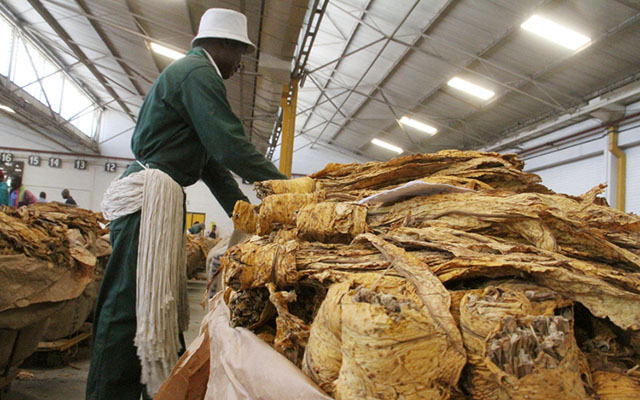
A bale of tobacco opened after being bought for us4,99 per kg at Tobacco Sales Floor in Harare yesterday. – Picture by Kudakwashe Hunda
Buhle Nkomo
“I am planning on buying a stand in Marondera to build my dream house and will definitely import a vehicle to ferry my farming inputs and produce this year.”
These are Kelvin Foya’s plans, which the 34-year-old tobacco grower from Magunje said after receiving his sales sheet. Foya realised $30 000 after selling 155 bales. This is three times what he realised last season.
“Tobacco farming is the way to go. I am happy that my hard work is paying off. While the prices are better this season, the quality of my crop has also improved,” he said.
The bales which had a total mass of 10 163 kilograms ranged from $1,25 per kilogram up to $4,99, with $3,12 as the average. Tobacco impact on lives“I cultivated four hectares of dry land and have so far delivered three quarters of the crop, which means that I still have tobacco to sell and more income to expect. “Out of four years of my farming experience, I declare this season as a bumper harvest.”
The tobacco grower credited his good returns to his physical presence at the farm and strict supervision of his crop throughout the year. He also adhered to good agronomic practices in the guidelines handbook produced by the Tobacco Research Board (TRB). “When the season started, I took a stance of working hard on my farm and making sure that required farming inputs are applied to the crop.
“It was a challenging season characterised by heavy rains which led to a lot of leaching of nutrients such as nitrogen and I had to buy more than 45 bags of calcium nitrate fertiliser to replenish the lost nutrients.
“The leaching of nutrients caused the yellowing of the crop leaves but after the application of calcium nitrate fertiliser, the leaves got firm and the colour for my crops came out as anticipated.”
The heavy rains also encouraged the growth of weeds. “This meant that I invested a lot of money not only on fertilisers but on herbicides. “I did my land disking early, soon after last season’s rains.
“Consequently my labour costs increased as a result because I had initially ridged so as to conserve water I had to destroy the ridges in a bid to drain excess water as well as to manage the weeds,” Foya said.
He urged farmers to take note of the tobacco seed varieties when preparing for their growing season as they contribute to the quality and final yield of the crop. “Throughout my farming experience I have learned that variety KRK26 is the best for my area as well as my region.
“Farmers should take into consideration that varieties perform in accordance to regions. Growers need advice on the best variety for their area,” he said. Foya practises crop rotation and rotates his tobacco with maize and soya beans in an effort to replenish lost nutrients and increase productivity on the farm.
Soya beans and maize are food crops that people on the farm feed on. He generates an extra income from their sale to augment his tobacco production. Apart from farming, Foya is also a builder who does his projects in his neighbourhood and sometimes in Harare when the opportunity presents itself.
Foya also encouraged tobacco farmers to use their own grower’s numbers so as to benefit from the export incentive.
For one to register as a tobacco grower, they simply need a copy of their national identification document, proof of land ownership, letter from their local AGRITEX officer and $10 registration fee.
As the marketing season progresses farmers are reminded that registration for the 2018 tobacco marketing season is underway and all growers should register before October 31, 2017, to avoid paying penalties. This information is needed for planning purposes.
Registrations and renewal can be done at TIMB offices located at each and every selling floor as well as TIMB offices.
TIMB is also conducting mobile registrations in the different farming areas where farmers can pay their growers’ registration fees using Point of Sale (POS) machines, accordingly tobacco growers are encouraged to contact TIMB regional offices for dates when mobile registration will be conducted near them.
Renewal of growers can also be done using ecocash and the TIMB Biller code which is 41986.
For additional Information contact TIMB on telephone numbers 08677004624 /6 or 0772145166 /9 or 0279-22082 /21982 or 025-3439 or 067-24268 /29246 or 0277-2700 or 064-7280 or 0271-6772 or Toll Free Numbers 08006003 /0731999999 /0712832804 or WhatsApp 0731999999 or E-mail: [email protected]
